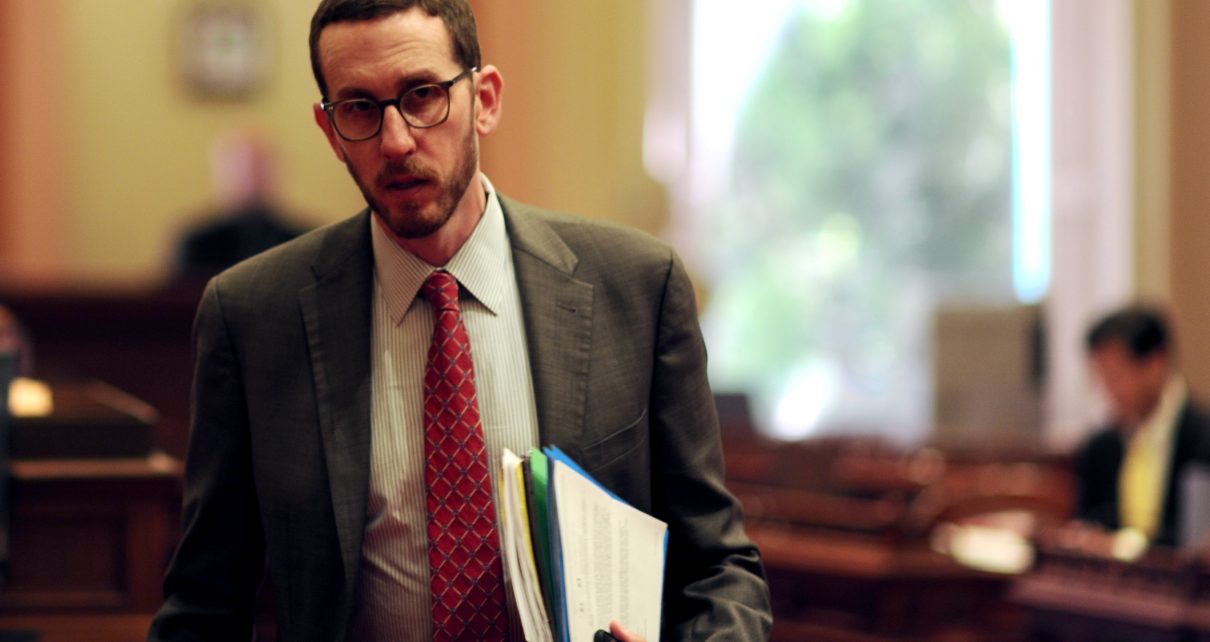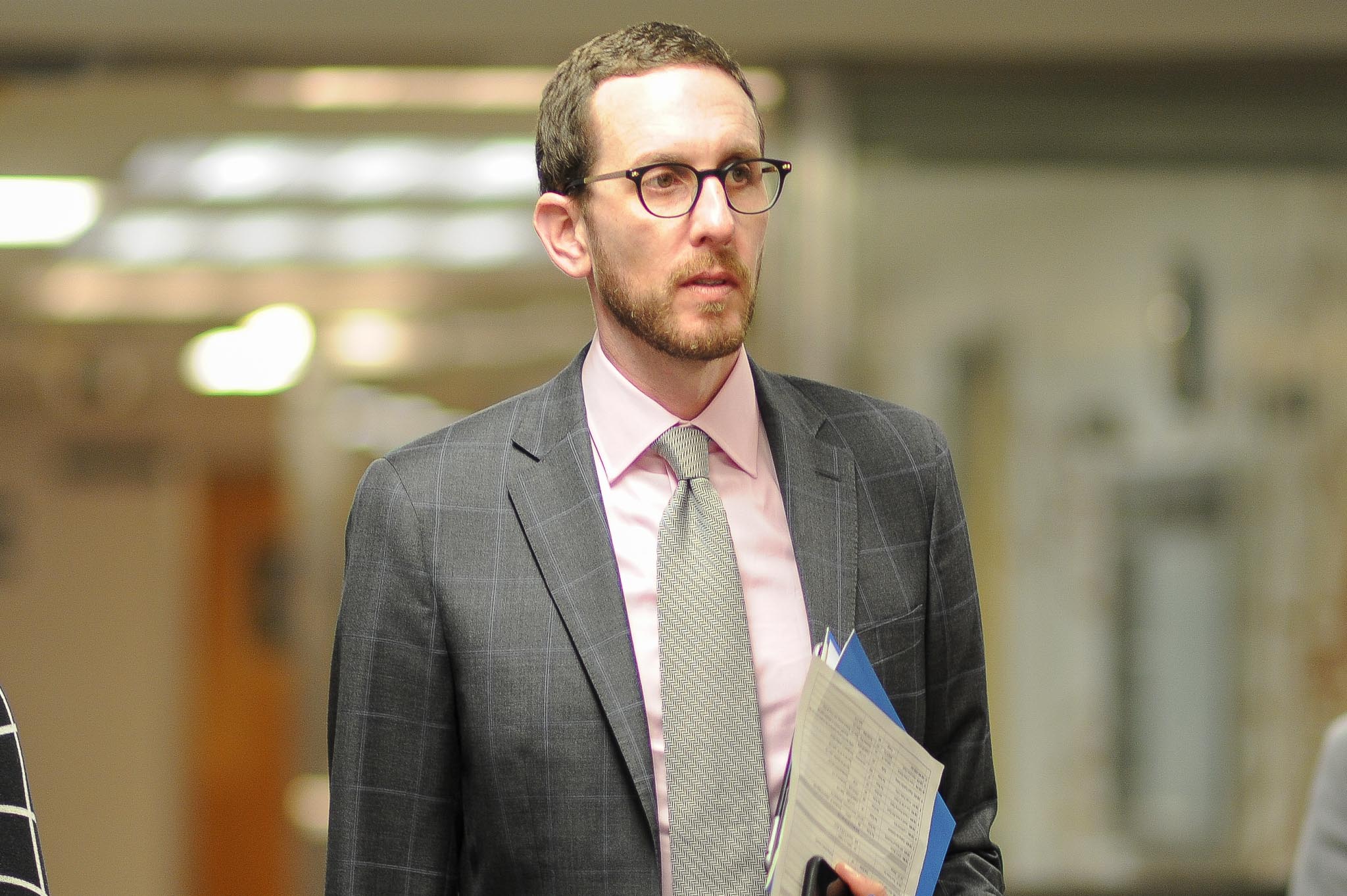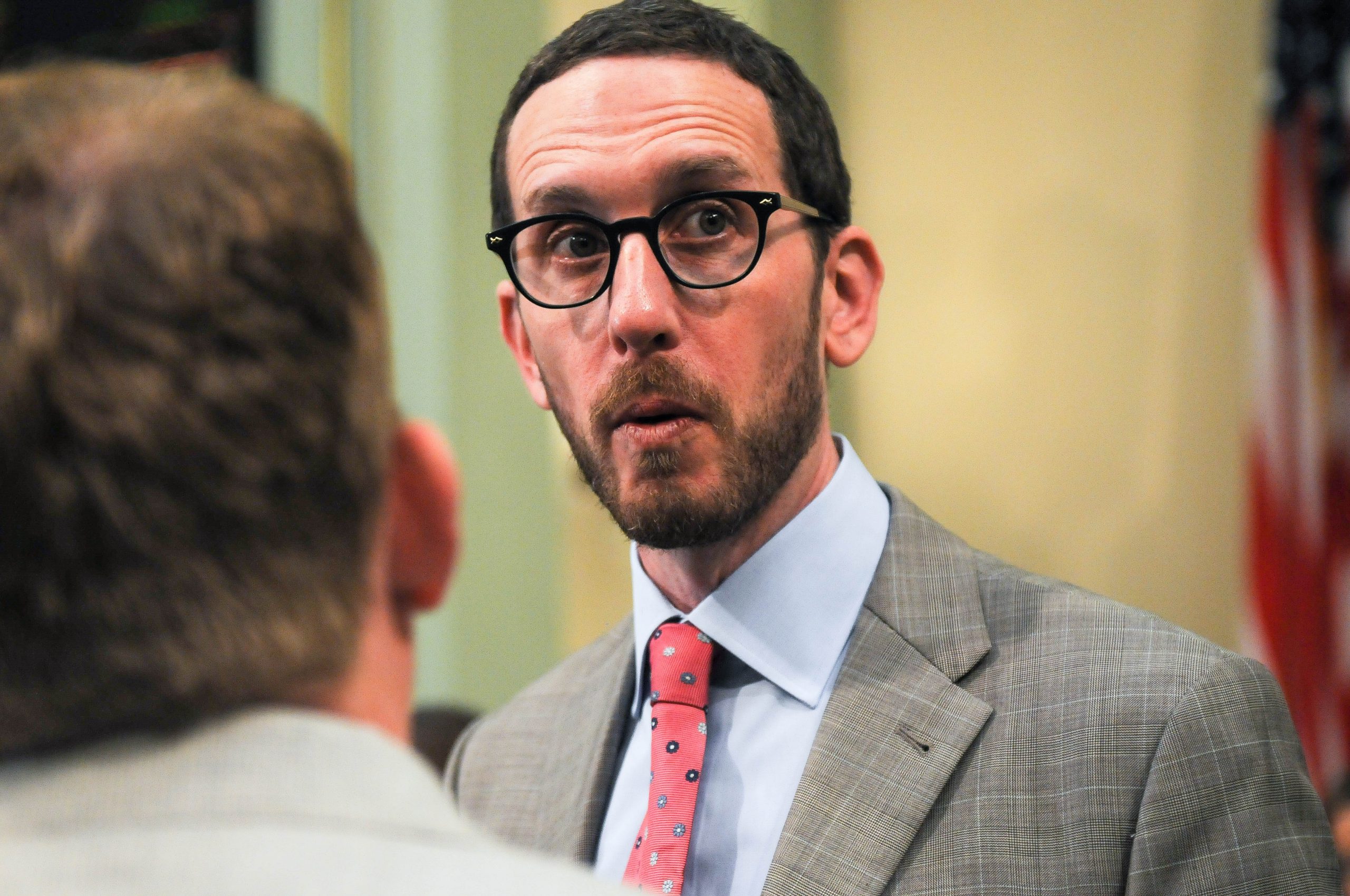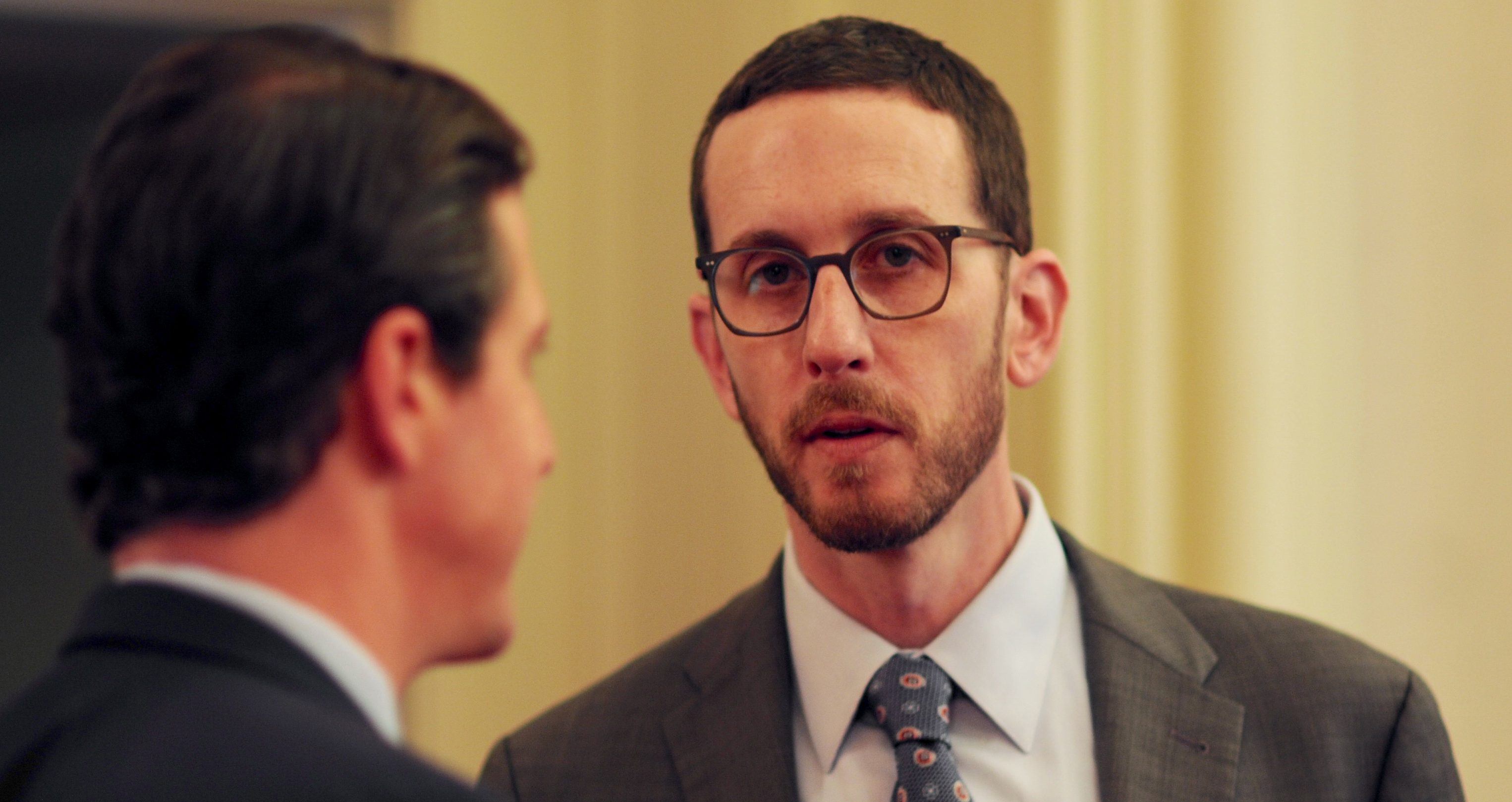
Senator Scott Wiener. (Photo: Kevin Sanders for California Globe)
Psychedelic Drug Decriminalization Bill Passed By Assm. Appropriations Comm.
‘Newsom is looking to run for president – being the Governor who legalized a bunch of drugs would not be a good look’
By Evan Symon, September 1, 2023 4:14 pm
A bill to decriminalize plant-based psychedelic drugs was passed by the Assembly Appropriations Committee on Friday, making the controversial bill one vote away before going to Governor Gavin Newsom to either sign into law or veto.
First introduced in December of last year, Senate Bill 58 by Senator Scott Weiner (D-San Francisco) proposed to decriminalize plant-based and other natural hallucinogens such as psilocybin (magic mushrooms), dimethyltryptamine (psychedelic drug DMT), ibogaine (psychedelic substance), and mescaline (psychedelic hallucinogen). In addition, law enforcement would be unable to charge those holding the drugs with a criminal penalty while also still being completely illegal for minors.
SB 58 also would remove bans on having psilocybin or psilocyn spores that can produce mushrooms, and on having drug paraphernalia associated with all decriminalized drugs. Specific limits outlined by the bill include up to 2 grams of DMT, 15 grams of Ibogaine, and 2 grams of Psilocybin.
The current form of the bill is a significantly pared down version of SB 519, first introduced in January 2021 by Weiner that would not only have legalized the psychedelics in SB 58, but also would have included synthetic hallucinogens such as lysergic acid diethylamide (LSD), ketamine (“dissociative anesthetic”), and 3,4-methylenedioxymethamphetamine (MDMA, ecstasy, molly). However, the bill was amended heavily in 2021 and 2022, removing ketamine, peyote derivatives of decriminalized mescaline, and other troubling parts for legislators and opposition groups, including law enforcement agencies. Despite the amendments, the bill was still gutted in August, removing everything but a single study on the use of the remaining drugs. In March, it was finally passed by the Senate Public Safety Committee, with the bill then moving directly to a Senate vote in May.
Passed by the Senate, SB 58 soon passed committees in the Assembly in June and July. With doubts still remaining if the bill could be passed this year, Wiener amended the bill once again, adding a provision requiring the California Health and Human Services Agency (CHHSA) to create a workgroup tasked with studying and making recommendations on the establishment of a framework for the therapeutic use of psychedelics. Last month, SB 58 was moved to the suspense file, readying it for a final push in September.
This all led to suspense bill Friday. Despite lingering doubts by many, the Committee approved the bill, sending it to a historical Assembly vote sometime before the September 14th deadline.
“I’m delighted that these historic bills will receive a vote on the Assembly Floor,” said Senator Wiener. “Our legislation to tackle the housing crisis, address climate change, and lower healthcare costs are first-in-the-nation measures that take bold steps to address some of the most serious challenges facing everyday Californians. I’m particularly excited to see that a vote will be held for decriminalizing psychedelics, an idea whose time has come. I look forward to working with my colleagues and a wide array of stakeholders to deliver these bills to the Governor.”
Up next is a full Assembly vote on the bill, which should come in the next few weeks. If passed, the bill would then go on to Governor Newsom, who would have until October 14th to sign it into law. Supporters remain confident that SB 58 will make it all the way through. Detractors, meanwhile, have said that the odds that the bill makes it through the Assembly vote, Newsom, all likely legal challenges, public scrutiny, and other hurdles is unlikely.
“The bill does have a good shot of passing the Assembly,” said former police officer and current drug counselor Marty Ribera. “But Newsom is the big one. He’s looking to run for president either next year or in 2028, and being the Governor who legalized a bunch of drugs would not be a good look. A lot of swing states or ones at risk for the Democrats, like Georgia, Virginia, and Florida, all have the majority of voting populations firmly against legalizing these drugs. Should he run, he could lose them, or at the very least, get a bunch of people not to vote for him. Marijuana took decades of work to be seen as acceptable. LSD and the other ones are nowhere near where they were.”
“The bill will also most likely be legally blocked if signed into law, so we are talking delays and a good chance it won’t make it. Then there is the California voter option, and you know how most feel about non-marijuana drugs. Add in the fact that you can mix in fentanyl worries, and I don’t see how anyone could have though that this bill could have a future.
“But, to be fair, it is currently up for an Assembly vote and has made it so far. The attitude currently is that it has been surprising that it made it so far, but don’t believe that it will hit the summit soon.”
SB 58 is to face a floor vote in the Assembly by September 14th.
- Bill to Require Law Enforcement Disclosure if AI Was Used To Help Write Reports - August 7, 2025
- Gov. Newsom Files FOIA Request To ‘Expose True Cost’ Of L.A. Federal Troop Deployment for Anti-ICE Riots - August 6, 2025
- California Redistricting: How Newsom’s Plan Will Demolish Hard Fought GOP Gains - August 6, 2025








Contact (call) your Assembly Rep ASAP and insist they VOTE NO on this bill from psychedelic hell —- Scott Wiener’s SB 58. If you did it before do it again as a reminder to your rep. This is bad enough on its own but is also a foot in the door to legalizing ALL DRUGS (God forbid) and we must do what we can to block it.
Keep in mind the assembly floor vote will happen anytime between now and Sept 14, as Evan Symon noted.
https://www.assembly.ca.gov/assemblymembers
They must VOTE NO on SB 58
“foot in the door to legalizing ALL DRUGS” is not supported by common sense or evidence of any kind. I get that this disturbs you, but the substances allowed by SB-58 have no similarity to methamphetamine, fentanyl, cocaine or other addictive substances. They are not addictive and have very low potential for abuse, especially compared with alcohol and tobacco. Colorado’s law is significantly more permissive, and hasn’t caused issues there. https://www.frontiersin.org/articles/10.3389/fpsyt.2023.1134454/full
“Science Facts”: I’ve said it before and I’ll be happy to repeat it as a reminder to CA Globe readers.
You and those like you (including Sen Scott Wiener) who have relentlessly pushed legalization of drugs have been proven to be untrustworthy, using poster-boy sob stories to jam through, with little discussion and NO debate, drugs whose major downsides are only brought to public light AFTER legalization. When full legalization of (now super-strength) marijuana —- which began with sob-story “medical marijuana” legalization, a joke —- triggers schizophrenia and other psychotic effects in young people and results in ruined lives and brain damage from obvious but denied addiction, as well as other previously unheralded effects of these drugs, have we heard one peep of apology from your camp? That maybe you were wrong? Or under-informed? Or that you engaged in endless half-truths by neglecting to mention important downsides? No. You’ve just moved on to the next inappropriate and harmful drug legalization attempt.
Would you please share with us what is your stake in this matter? Why do you care so much about legitimizing psychedelics? If those who ‘benefit’ are using these substances now, why not continue and leave it at that? Why is the present method of procurement and use not enough to help those who supposedly ‘benefit,’ such as “combat veterans?” Is Big Pharma looking to get on board with this? Have you been designated or have you designated yourself as some sort of a spokesperson for this effort?
There are plenty of valid arguments to be against this legalization, many of which have been made on this site. Knowledge of different kinds of substances, simple observation, friends and relatives affected, and solid common sense are all more than enough reason to take a stand against this effort to legalize. Really, the idea is clearly absurd on its face given the tortured souls who abound on the streets, easily seen by all, who are suffering from psychosis and other mental illness already. Why on earth would anyone want to increase that suffering or produce more who suffer?
“Showandtell”: I’ve said it before and I’ll be happy to repeat it as a reminder to CA Globe readers. You and those like you who insist on keeping medicine away from people who need it may be well-intentioned but your prohibitionist approach is fully discredited. “You will become an addict” and “brain and chromosome damage” stories were fabrications of the War on Drugs. You think these substances are “dangerous.” Well gasoline or NSAIDs or Clorox really are dangerous. But that’s no reason to prohibit them entirely.
Would you please share with us what is YOUR stake in this matter? Why do you care so much about keeping legal barriers between people and medicines? Why keep people away from a significant benefit that can obviously be managed with (and most often even without) community support? Why is prohibition so important? Does Law Enforcement really need another excuse to stop and search your car whenever they want to see what substances are there? Is Big Pharma looking to protect their stake in antidepressants and other drugs that don’t actually work for half of patients?
To your credit, you notice drug addicts on the streets. For whatever reason, they aren’t able to manage their affairs. And if substances are contributing to their problems those substances are opioids, fentanyl, methamphetamine or alcohol, not psilocybin. Psilocybin cannot damage your brain and cannot kill you; there is no known lethal dose. Prohibiting psilocybin to prevent drug addiction is about as smart as it would be to prohibit Narcan (another powerful and rather dangerous substance, by the way) for overdoses.
@Science Facts, the studies reviewed in the article (your link) had very small sample sizes (e.g., n=10, n=31….) and so the conclusion regarding benefits of these drugs is INCONCLUSIVE:
“Larger RCTs in patients with SUDs need to evaluate whether psilocybin-assisted therapy is effective in patients with SUD.”
@Science Facts, if you would like an explanation of why sample size matters (even in meta analyses) you may want to read up on the topic of ‘statistical power’ in a recommended statistics textbook.
I agree that the sample sizes in the studies are small, and the study I linked acknowledges that fact. It is important to note *why* the sample sizes are so small! Schedule I status inflates costs and stretches research timelines. Researchers have a much harder time funding studies, DEA bureaucracy gets involved, all materials have to be signed out, secured and accounted for (similar to handling TS classified documents), IRBs are much more demanding, the California Research Advisory Panel has to support the research, and any number of other impediments prevent larger studies from getting off the ground, no matter the obvious efficacy of the substances themselves. Some researchers (Fadiman and Korb) developed self-reporting protocols where self-blinded users take their own illegally obtained or prepared materials on their own property. This is still not a great way to do research.
Unfortunately it is extremely difficult to de-schedule substances once they get on Schedule I. Given the tangle of bureaucracies, side-stepping the DEA schedule is the only way to move research forward or get help to people who need it in a reasonable time frame. The substances addressed in SB-58 are not addictive and have a remarkably good safety profile and aren’t producing ER visits. Hence the push to legalize at the state level.
What does this mean: “law enforcement would be unable to charge those holding the drugs with a criminal penalty while also still being completely illegal for minors”? If an adult is in possession, and not providing it to a minor, there’s no violation. Anybody in possession near schools would still be illegal. Providing drugs to minors would be punishable with imprisonment. Minors in possession are punished with education and community service hours. All this is comparable to a minor found to be driving without a licence or allowing an underage minor to drive.
Readers please be sure to call your Assembly Rep ASAP and insist they VOTE NO on Scott Wiener’s SB 58.
Assembly floor vote will happen BETWEEN now (or probably Tues., Sept 5) and Sept. 14.
https://www.assembly.ca.gov/assemblymembers
Insist that your Assembly member cast a NO VOTE on SB 58
And please share this.
I do not want my state to continue to have drug tourism be a national attraction because too many of them never leave once the “helpful non-profits” get their hooks in them.
Definitely agree, Chuckiechan.
“Here’s the plan, we get all drugs legalized, we give the drugs to the kids and then we can either rape them or convince them that God incorrectly assigned them the wrong gender” signed, The Perverts who support Wiener.
You got it. 100%.
“Tomorrow”, you’re missing the point of the drug trade: money. Dealers don’t make money off of rape or gender issues. They make money when otherwise healthy people are addicted to their wares. The materials in SB-58 are categorically not addictive.
@Science Facts:
“They make money when otherwise healthy people are addicted to their wares.”
They sure do. And one way that drug dealers make healthy people addicted is to give them the drugs for free – to start with. Then, they raise the price after people are addicted. They create the demand where there was little demand to begin with.
“The materials in SB-58 are categorically not addictive.”
How was this determined? In large RCT studies with replication?
How is SB-58 related to opiate / fentanyl / meth dealers?
“Classical psychedelics” LSD, psilocybin and mescaline have been known to be non-addictive at least since the 1960’s. They were being studied heavily for alcoholism and other addiction disorders at the time the War on Drugs shut research down abruptly. It makes no sense when you posit that fentanyl dealers would give their potential customers anti-addiction drugs. There isn’t even anecdotal evidence for addictive potential. Michael Pollen’s book has a nice writeup of what happened. Or, there are plenty of peer-reviewed journal articles to peruse. For example:
https://link.springer.com/article/10.1007/s13311-017-0542-y
https://www.ncbi.nlm.nih.gov/pmc/articles/PMC6985449/
Why did you people suddenly remove Ibogaine from the list?
Good question N.
https://www.healthline.com/health/ibogaine-treatment
I can only guess why ibogaine was edited out of SB-85’s latest version. First, it’s hard on the body and is dangerous if overdosed. Second, psilocybe mushrooms aren’t that hard to cultivate, and San Pedro cactus (a source of mescaline) is legal and commonly grown in gardens. If the substances are legalized, they would be available by home-growing (as in Colorado). Iboga is much harder to cultivate. Third, iboga doesn’t have as many friends, probably because it’s less well-studied.
No doubt creepy weird Democrat Senator Scott Wiener and his fellow creepy Democrats in the legislature want as many Californians as possible hallucinating and drugged out of their minds so Democrats can implement their Marxist globalist agenda with as little opposition as possible?
“A ‘poop’ rampage in Wyoming is an important insight into today’s homeless”
https://www.americanthinker.com/blog/2023/09/a_poop_rampage_in_wyoming_is_an_important_insight_into_todays_homeless.html